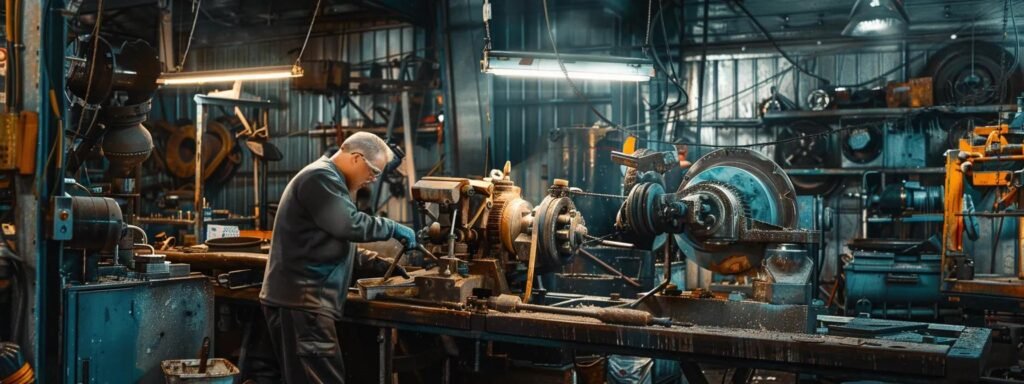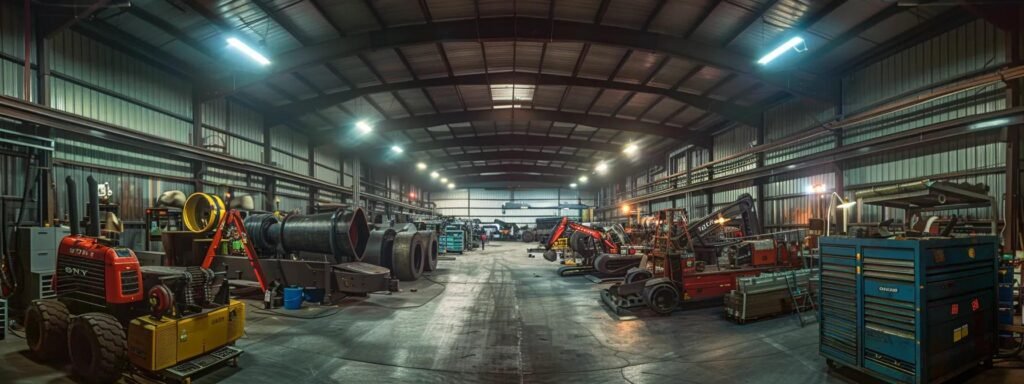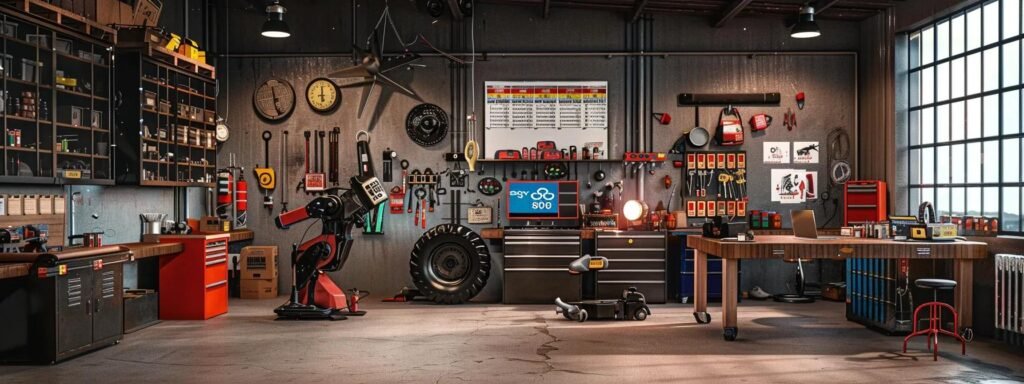
Upright Forklift: Expert Heavy Equipment Repair Services
Introduction
Businesses that rely on heavy equipment—from construction companies and mining operations to agricultural enterprises—face the challenge of maintaining machinery to prevent costly downtime. Heavy equipment malfunctions can lead to production delays, increased repair costs, and safety hazards. This article explains the various repair solutions, the importance of preventive maintenance, and how to verify service quality. It provides comprehensive insights into mobile repair services, in-shop repairs, and specialized repair options, empowering heavy machinery operators to make informed decisions that enhance productivity and reduce downtime.
What Are the Main Types of Heavy Equipment Repair Services?

Heavy equipment repair services are generally divided into three categories: mobile repair, in-shop repair, and specialized repair. Each type ensures machinery operates safely and reliably.
How Does Mobile Heavy Equipment Repair Work?
Mobile repair technicians travel directly to the job site, diagnose issues with advanced diagnostic tools, and perform repairs onsite. For example, if a loader has hydraulic issues, a technician can quickly fix it without moving the equipment. This minimizes downtime, reduces logistical delays, and lowers repair costs.
What Services Are Included in in-Shop Heavy Equipment Repair?
In-shop repairs occur at specialized facilities equipped with high-end machinery for precision tasks. Services include engine reconditioning, transmission rebuilds, welding, gearbox repairs, and electronic calibrations. These controlled environments ensure high-quality work and often include supplementary services like cleaning and parts sourcing before the equipment is returned to service.
Why Is Preventive Maintenance Important for Heavy Equipment?
Preventive maintenance addresses issues before they escalate into major failures. Regular tasks such as oil changes, hydraulic fluid checks, and inspections extend the equipment’s lifespan and help avoid emergency repairs. Companies that follow preventive maintenance schedules can reduce unplanned downtime by up to 30%, maintain warranty claims, and ensure consistent safety and performance.
When Should You Request Emergency Heavy Equipment Repair?
Emergency repairs are needed when immediate issues compromise safety or interrupt operations. Signs such as engine failure, unstable hydraulic performance, or erratic electrical behavior should prompt an urgent service call. Although emergency repairs are more expensive due to after-hours work, prompt action is essential to prevent further damage and ensure operator safety.
What Specialized Repairs Are Common in Heavy Equipment?
Specialized repairs target critical systems that require expert attention. Examples include hydraulic system overhauls, transmission rebuilds, engine diagnostics, and electronic control unit recalibrations. These repairs often involve computer-guided diagnostics and precise replacement techniques, ensuring that equipment is restored to peak performance and long-term reliability.
How Can You Find Mobile Heavy Equipment Repair Near Me?
Finding reliable mobile repair services is essential to minimize downtime during unexpected breakdowns. Operators should research local providers who specialize in onsite repairs for their specific machinery. Reviews, testimonials, and certifications are key factors for evaluating the reliability and quality of mobile repair technicians.
What Are the Benefits of Choosing Mobile Repair Services?
The main benefit of mobile repair is the ability to resolve issues on-site quickly, avoiding the need to transport heavy machinery. This reduces downtime and logistical costs, offers flexibility in varied work environments (mining, construction, or agriculture), and improves communication between the technician and client. The result is enhanced overall productivity and reduced operational disruption.
How to Verify the Expertise of Mobile Repair Technicians?
Verify a technician’s expertise by checking for recognized certifications, past project references, and customer reviews. Providers typically list credentials and use up-to-date diagnostic tools and a well-stocked parts inventory. Contacting previous clients or reviewing case studies can provide additional assurance of their problem-solving capabilities.
Which Industries Commonly Use Mobile Heavy Equipment Repair?
Mobile repair services are used across industries such as construction, mining, agriculture, and industrial manufacturing. In construction, mobile repair keeps backhoes, excavators, and trucks operational on remote sites; in mining, it prevents production stoppages; and in agriculture, it maintains tractors and combines during critical harvest periods.
What Should You Expect From Heavy Equipment Repair Near Me?

Local heavy equipment repair services should provide thorough diagnostics, quality repairs, and strong customer support. Customers can expect detailed repair estimates, a mix of preventive maintenance, emergency repairs, and specialized services to keep machines running reliably.
How to Evaluate Repair Shops for Heavy Equipment Services?
Operators can evaluate repair shops by considering factors such as repair quality, service reliability, technician certification, turnaround time, and customer testimonials. Visiting the facility to review equipment, completed projects, and asking detailed questions can help confirm that the shop provides transparent pricing and uses genuine replacement parts.
What Are Typical Repair Turnaround Times?
Repair times vary based on the issue’s complexity and parts availability. Routine maintenance or minor repairs may be completed within hours or a day. Complex repairs, such as engine or transmission rebuilds, might take several days. For emergency situations, many providers guarantee a technician visit within 24 hours. Clear communication about turnaround times and potential delays is a key sign of quality service.
How Do Repair Shops Source and Replace Heavy Equipment Parts?
Repair shops obtain parts from authorized dealers or directly from manufacturers, ensuring compatibility and longevity even though genuine parts may be more expensive than aftermarket alternatives. Many shops keep an inventory of commonly used parts and offer warranties on both parts and labor, providing extra security and post-service support for equipment maintenance.
How Does Preventive Maintenance Extend Heavy Equipment Lifespan?
Preventive maintenance is critical for keeping heavy machinery operating at peak efficiency, thereby avoiding unexpected breakdowns. Regular, scheduled maintenance can substantially extend equipment lifespan and reduce long-term repair costs.
What Are the Key Components Checked During Preventive Maintenance?
During preventive checks, technicians inspect key elements like the engine, hydraulic systems, transmission, and electrical circuits. They assess fluid levels, filter conditions, belt tensions, and component wear. Special attention is given to potential issues such as hydraulic fluid contamination or abnormal vibrations. Documenting these checks helps address issues early and maintain optimal machine performance.
How Often Should Heavy Equipment Undergo Preventive Maintenance?
The frequency of maintenance depends on usage intensity, environmental factors, and manufacturer recommendations. Some machines require monthly inspections, while others are maintained every 250 to 500 operating hours. In high-duty or harsh environments like mining and construction, more frequent checks are necessary to prevent accelerated wear and unexpected downtime.
What Are the Cost Benefits of Regular Maintenance vs. Emergency Repairs?
Regular maintenance is far more cost-effective than emergency repairs, which often come with premium charges due to urgency. Scheduled maintenance allows for predictable budgeting and reduces the risk of catastrophic failures that cause prolonged downtime. Companies that invest in routine servicing report improvements in fuel efficiency and overall productivity, often saving up to 30% on repair costs.
Why Choose Certified Technicians for Heavy Equipment Repair?

Certified technicians bring the expertise and accountability needed to perform complex repairs accurately and safely. Their rigorous training and certification ensure they are well-versed in the latest diagnostic and repair techniques, minimizing downtime and enhancing equipment longevity.
What Certifications Should Heavy Equipment Repair Technicians Have?
Technicians should hold certifications from recognized bodies such as ASE or specific manufacturer certifications related to hydraulic, diesel engine, and electronic diagnostic repairs. These credentials verify their technical competence and adherence to industry standards, giving clients confidence in the quality of the repair work performed.
How Does Technician Experience Impact Repair Quality?
Technician experience is crucial for diagnosing subtle issues and delivering effective repairs. Experienced professionals quickly identify underlying causes of machinery malfunctions and use proven repair strategies to prevent recurring problems. Their skills also contribute to maintaining safety standards and ensuring long-term machine reliability.
How Do Technicians Handle Different Equipment Brands and Models?
Certified technicians are trained to work on a wide range of heavy equipment brands and models. Their manufacturer-specific workshops and continuous training ensure they understand unique design features and system specifications. This versatility allows them to efficiently troubleshoot and repair diverse machinery, ensuring consistent quality across varied equipment types.
What Are the Signs Your Heavy Equipment Needs Immediate Repair?
Operators must monitor heavy equipment for early warning signs that indicate a need for immediate repair. Detecting problems early can prevent catastrophic failures, reduce repair costs, and minimize downtime.
How to Detect Hydraulic System Failures Early?
Key signs of hydraulic failure include visible fluid leaks, unusual hissing or grinding noises, and reduced responsiveness in controls. Fluctuations in fluid levels or abnormal pressure readings are also indicators. Regular monitoring and periodic maintenance help address these issues before they cause significant damage.
What Are Common Engine Problems in Heavy Equipment?
Common engine issues include a drop in power output, rough idling, increased fuel consumption, and smoke emissions from the exhaust. These symptoms can indicate problems such as worn pistons, clogged filters, or timing issues. Routine engine diagnostics and regular oil changes are vital to catch these issues early and prevent severe damage.
When Is Electrical System Repair Urgent?
Electrical system problems should be treated as urgent when dashboards show inconsistent readings, lights flicker or dim, or power to specific components is lost. Modern heavy machinery relies on complex electronics to manage critical functions, so any disruption can affect overall safety. Prompt electrical repairs help prevent further issues and safeguard operational integrity.
How Is Transparent Pricing Important in Heavy Equipment Repair?

Transparent pricing builds trust between service providers and customers by preventing unexpected costs and helping clients understand what they are paying for. Clear breakdowns of labor, parts, and additional fees are essential, particularly in repair contexts where costs can quickly escalate.
What Should a Detailed Repair Estimate Include?
A comprehensive repair estimate should detail labor charges, parts costs, diagnostic fees, and any extra fees that might occur if additional work is needed. It should also outline warranty details and post-service support. An itemized estimate enables customers to compare repair options and plan their budgets effectively.
How to Avoid Hidden Fees in Heavy Equipment Repair?
To avoid hidden fees, customers should thoroughly review repair estimates and contracts, ask for clarification on ambiguous charges, and check customer testimonials for transparency. Reputable repair companies use clear billing practices and provide detailed documentation to ensure no unexpected costs arise.
Are There Financing or Warranty Options Available?
Many providers offer financing options, such as installment plans or deferred payments, to help manage repair expenses. Extended warranties on parts and labor add an extra layer of security, assuring customers that any subsequent issues will be addressed without excessive additional costs. These options are especially valuable for companies relying on heavy machinery for day-to-day operations.
Maintaining Heavy Equipment: Proven Repair and Preventive Strategies
Heavy equipment repair services are vital for smooth operations, minimizing downtime, and ensuring machinery reliability. Whether through mobile repair, in-shop services, or specialized repairs, understanding the repair options and maintaining transparent, preventive maintenance practices help safeguard investments and optimize productivity. Choosing certified technicians and reviewing detailed repair estimates further ensures that repair work meets high standards, supporting long-term operational efficiency.
Frequently Asked Questions
Q: What is the primary advantage of mobile heavy equipment repair? A: Mobile repair services quickly address issues onsite, reducing the need to transport equipment and significantly cutting downtime and logistical costs.
Q: How often should preventive maintenancebe conducted on heavy machinery? A: Maintenance should follow manufacturer guidelines—typically every 250–500 operating hours or monthly—depending on usage and environmental factors, to prevent unexpected breakdowns and ensure safety.
Q: Why is transparent pricing so important in heavy equipment repair? A: Transparent pricing prevents unexpected costs, builds trust, and allows for effective budget planning through clear, itemized repair estimates.
Q: What certifications should a heavy equipment repairtechnicianhave? A: Technicians should be certified by recognized organizations like ASE or by manufacturers, specifically for hydraulic repair, diesel engine maintenance, and electronic diagnostics.
Q: How can I identify early signs that my equipment needs urgent repair? A: Watch for hydraulic leaks, unusual engine noises, erratic electrical readings, and decreased responsiveness. Timely repairs can prevent extensive damage and high emergency repair costs.
Q: Are financing options available for heavy equipment repairservices? A: Yes, many providers offer financing plans and service contracts that bundle preventive maintenance with repairs to help manage costs and maintain budget stability.
Q: What types of repairs are considered specialized for heavy equipment? A: Specialized repairs include hydraulic system overhauls, transmission rebuilds, engine diagnostics, and electronic control unit updates, all of which require advanced expertise and equipment.
| Service Type | Key Benefit | Typical Turnaround Time | Example Repair Task |
|---|---|---|---|
| Mobile Repair | Minimal downtime | 1–24 hours | Onsite hydraulic seal replacement |
| In-Shop Repair | Comprehensive diagnostics | 2–5 days | Engine reconditioning |
| Specialized Repair | High precision and expertise | 3–7 days | Transmission rebuild |
| Preventive Maintenance | Proactive issue resolution | Scheduled service | Regular fluid and filter check |
| Emergency Repair | Urgent response for safety | Within 24 hours | Immediate electrical system fix |
Before purchasing any repair service, customers should consider the specific demands of their operations. A comparison table like the one above helps clarify service types, benefits, and turnaround times, enabling informed decision-making.
- Mobile heavy equipment repair services reduce downtime with onsite fixes.
- In-shop repair facilities ensure controlled, high-quality diagnostics.
- Preventive maintenance extends equipment lifespan and reduces major failures.
- Transparent pricing and certified technicians provide reliable, predictable service.
By evaluating repair options carefully and following these guidelines, businesses can keep their heavy equipment operational and efficient, ultimately supporting sustained productivity and profitability.
